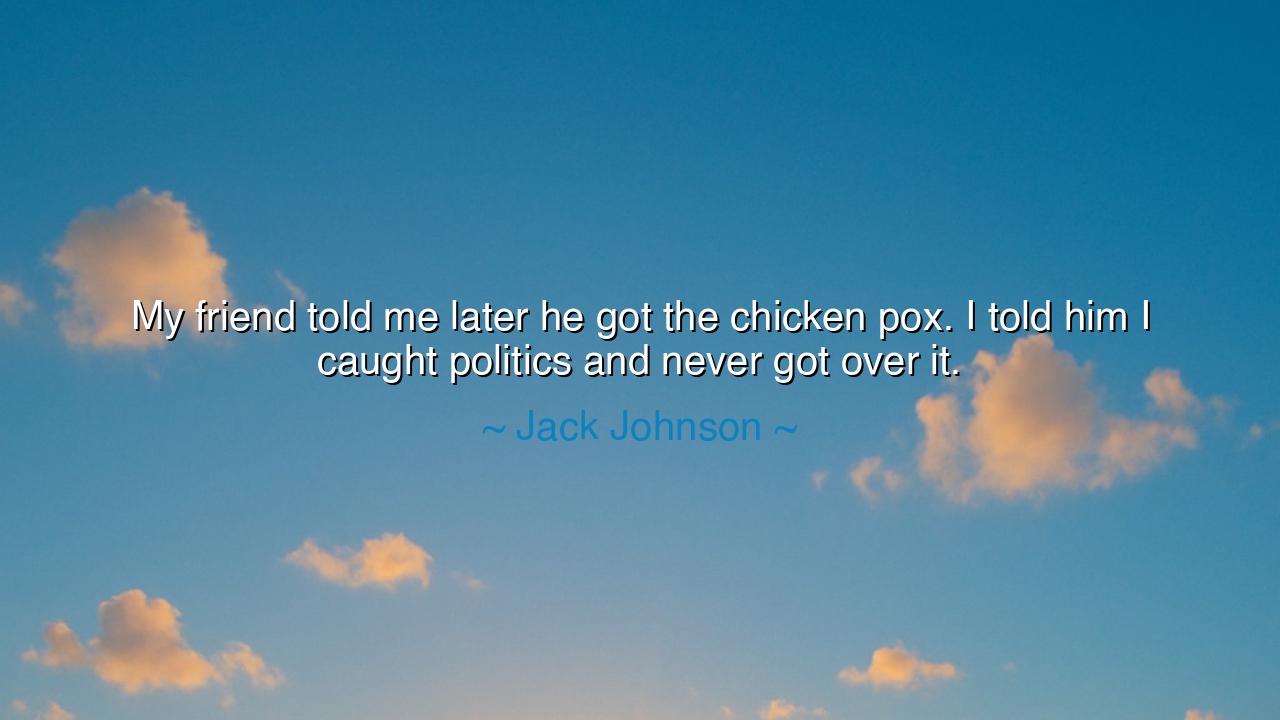
My friend told me later he got the chicken pox. I told him I
My friend told me later he got the chicken pox. I told him I caught politics and never got over it.






When Jack Johnson declared, “My friend told me later he got the chicken pox. I told him I caught politics and never got over it,” he spoke with humor, yet beneath the jest lay a deep truth. For politics, once it enters the blood, is like a fever that never departs. Unlike childhood sickness, which passes and leaves only faint scars, the passion for justice and the struggle for power remain as a lifelong condition, shaping thoughts, words, and deeds forever.
His words reveal that politics is not merely an interest, but a calling. It seizes those who witness injustice, who taste the bitterness of inequality, or who feel the thrill of shaping the destiny of a people. Once the spirit is awakened to this force, it cannot return to slumber. As a man cannot unknow the truth once it is seen, so too can he not rid himself of the infection of politics once it grips him.
The ancients themselves spoke of such fire. In Athens, Pericles declared that to take no part in the affairs of the city was to be useless, as though citizenship itself carried an incurable duty. Similarly, in Rome, men like Cato and Cicero, though weary and embattled, could not leave the Senate, for politics had lodged itself in their souls. They may have wished for peace, but the fever of duty bound them to the struggle.
History gives us vivid examples of this lifelong “sickness.” Nelson Mandela, imprisoned for decades, might have abandoned politics for personal peace when offered release. Yet the political fever burned within him still, and he emerged from captivity not to retire, but to lead his nation. His life illustrates Johnson’s words: politics, once caught, is not a passing ailment but an enduring state of being.
Thus, let this wisdom endure: do not take lightly the moment when politics first enters your heart. For it is no passing illness, but a transformation, a fire that remakes your destiny. Some may recover from childhood diseases, but those who “catch” politics are bound to carry it all their lives—sometimes as a burden, sometimes as a gift, but always as a force that cannot be escaped. And in this, Johnson’s jest becomes prophecy: politics is the one fever from which no cure should be sought.






CCDau Cong Cung
I really like the humor in this quote, but it makes me reflect on how politics can feel all-consuming at times. The idea of 'catching' politics and never getting over it suggests that the effects of political involvement can be long-lasting. How do we keep a sense of personal identity and peace of mind while staying politically engaged in a world that often feels divided and stressful?
VANguyen thi van anh
Jack Johnson’s comparison of politics to chicken pox is a funny but insightful way to express how deeply politics can affect someone. It feels like once you’re exposed to it, you can’t easily avoid it. But I wonder—what happens when you’re stuck in the world of politics and can’t escape the negativity? Is there a way to be involved without getting overwhelmed or losing hope?
PXPham Xuan
This quote made me chuckle, but it also holds a lot of truth. Politics can be so overwhelming, and once you get involved, it feels like it’s always on your mind. But it raises an interesting question: How do we deal with the constant noise and still maintain our well-being? Is it possible to engage with politics in a healthy, balanced way without letting it take over our lives?
7PTran 7a6 Pham
Jack Johnson’s humor in this quote is spot on. It’s a clever way of saying that once you get involved in politics, it’s hard to shake off—like an illness that sticks with you. But it also makes me think: Is there a way to engage in politics without letting it consume you? Can we separate our personal lives from the political chaos, or is it something that inevitably becomes a part of who we are?